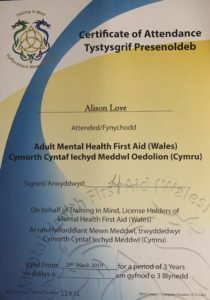
CIPD in Wales Awards 2024 Best Learning and Development Initiative
We had a fabulous evening at the CIPD in Wales awards on Friday! We wined, we dined and we danced the night away. It was fantastic… Read more »
Email: [email protected] Tel: 08000 489235 LinkedIn
I have recently completed a Mental Health First Aid course. The reason for doing this course was to ensure that when I am working with people in conflict situations, I am taking full account of the individual’s mental health and that I am not unwittingly exacerb ating any health conditions.
ating any health conditions.
The course was very interesting, it consolidated my lay persons’ knowledge and previous learning and dispelled a number of myths; it also thankfully reassured me that the approach that we take is absolutely the right one.
Mental health is defined as “the emotional and spiritual resilience which allows us to enjoy life and survive pain, disappointment and sadness. It is a positive sense of well-being and an underlying belief in our own and others dignity”
Mental health influences how we think and feel about ourselves and others, how we interpret events, communicate, behave and sustain relationships and our ability to cope with change. It is therefore not surprising that this may contribute to misunderstandings between individuals and be a contributing cause to workplace conflict.
Some commentators express concern about proceeding with mediation where there are mental health concerns. I would argue that in the vast majority of cases, it makes the case for mediation or similar approaches even stronger and my reasoning for this is as follows.
Ultimately, it is for the individuals concerned to decide whether or not to proceed with mediation. Our job and the role of employers is to ensure that all concerned are given the opportunity to decide for themselves and to decide on a fully informed basis taking into account the benefits and value of mediation and the alternative options available.
For more information about mediation and how it works and alternative approaches to resolving workplace issues please do not hesitate to contact us on 07808 829545/01446 760993 (Wales) 07766562730/0117 3739192 (England) or email us at [email protected]
Follow us on LinkedIn, where we provide details of latest news, upcoming events and links to interesting articles around the topic of conflict resolution, mediation and training.
The report was very professional, it dealt with all the issues raised and was particularly thorough. It clearly took the time to fully understand all of the issues and background. It was complex but the report really helped to break it down and I’m hoping we can progress in a positive manner following the recommendations.
Group HR Manager, Energy Sector |

We had a fabulous evening at the CIPD in Wales awards on Friday! We wined, we dined and we danced the night away. It was fantastic… Read more »
3 new members of the Resolution at Work team have recently become certified in the fantastic Conflict Dynamics Profile model for conflict coaching, and we have… Read more »
It is not uncommon for conflict to arise between different teams. This can have considerable impact on both individuals and performance. A number of approaches can be used in this sort of scenario, including neutral assessment, team facilitation and group mediation.
Agreement could not be reached to enter into mediation in this situation and therefore coaching was an alternative support provided to one of the parties. The relationship between a majority shareholder and a shareholder/director was causing conflict. The relationship would be ok at times but disagreements would flare up from time to time and this was beginning to impact on the business.